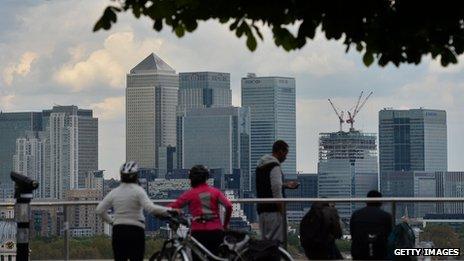The ghost of banks to come
- Published
- comments

The fog covering the future shape, size, ownership and culture of British banks should lift a bit in the next nine days, as first the Parliamentary Commission on Banking Standards issues its final report and then we have the chancellor's annual report to the City in his Mansion House speech.
Actually it's not 100% that the views of the commission will have been crystallised and published by then.
Today its 10 members - MPs and Lords who include the current Archbishop of Canterbury, one of the most influential of post-war chancellors, and a former head of the civil service - meet for the first time since March.
They will discuss a draft report of more than 550 pages, written by the Commission's chairman, Andrew Tyrie, and 100 pages of amendments submitted by the members (see here for more on this).
Reaching a consensus on every one of the contentious issues - and Tyrie has told his colleagues he would like to reach a consensus view rather than a majority view - will not be easy.
So the aim of finishing it all by the end of the week is a stretch.
The meat of the report is implied by what's written on the tin, so to speak - it is about banking "standards".
There will therefore be recommendations on how to make it easier to ban and punish senior bankers who preside over the kind of debacles we saw at Royal Bank of Scotland (RBS), Lloyds and Northern Rock in 2007-8.
There is a view on the commission (and more widely) that banks aren't like normal companies, in the sense that they are perceived as so pivotal to our economic well-being that most governments will bail them out rather than let them go bust (and that's likely to remain the case, even as attempts are being made to lessen the systemic impact of banking failure).
One implication is that the standards of stewardship and governance we regard as acceptable for most companies are too low for those who run banks - such that somehow the superior due care we need from bank directors and senior executives has to be made explicit, and breaches properly punished.
This will not be easy. It cuts across company law and natural justice. But it is pretty important (arguably).
And, to state the bleedin' obvious, the commission will have something to say about pay.
It will probably lament that new rules from Brussels placing lower limits on bonuses have encouraged banks to push up the fixed or salary element in remuneration. Or to put it another way, hard times for top bankers appears to be against the laws of nature.
So the commission will try to rehabilitate variable pay by saying the wonga should be handed over not in the course of one-to-three years from the date of award, but over a decade or so - till enough time has elapsed to really judge whether banker's conduct and deals are yielding delicious or rotten fruit.
Then there's that recommendation in Tyrie's draft report I mentioned last week, namely that RBS's residual toxic assets should be hived off and kept in the public sector, to give a bit more oomph and sparkle to what would be left of RBS (an enormous bank), that would then be privatised.
The Commission's members are split on whether to go with Tyrie's suggested wording, which is a pretty explicit call for cleaning up RBS in this way, or whether they should instead ask for a detailed and rigorous analysis of the costs and benefits of such a reconstruction.
There is unease among members that the commission itself hasn't carried out such a forensic cost/benefit assessment, and is currently relying to an extent on the backing for such an RBS reconstruction given by the retiring governor of the Bank of England, Sir Mervyn King.
For what it's worth, and contrary to widespread reports, the chancellor is not implacably or ideologically opposed to breaking up RBS, and nor are his officials.
They're just not clear whether dismantling RBS in this way would be good or bad for taxpayers' wealth.
I am pretty clear, therefore, that breaking up RBS will remain a live option for some time yet.

Which brings us to what the chancellor is likely to say next week at the Mansion House on the timetable for privatising Lloyds and RBS.
Just so you know, officials recognise that if price were not an issue, the process of flogging taxpayers' 39% holding in Lloyds could begin tomorrow.
But price is a huge issue. The Chancellor has to decide what method of selling Lloyds, and on what timetable, delivers the best prospect of taxpayers recouping the £20bn they've invested in the bank.
That will not be easy.
And to compound his woes, if he says something in coming days as precise as that he is minded to start the selling process by the end of the year, he will create a huge incentive for every hedge fund in the world to short-sell the stock and drive the price down - because they'll know a huge chunk of the company is about to be offered.
So George Osborne will have to say something that creates momentum towards privatisation, but doesn't bind him.